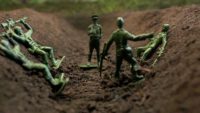You have no items in your cart. Want to get some nice things?
Go shoppingThe two squadrons of soldiers stare blankly at each other, silently, relentlessly, with what depth of hatred I cannot imagine, across the unbroken brown surface beneath them.
Chris’s army is conventionally helmeted and uniformed, almost certainly uninformed — his men (no women fighting our wars) in drab olive green. His stolid waiting troops are neither guerilla forces crouched in hiding behind rocks or hidden in far-off building with high-power sniper rifles. Rather, some in the front line, about to lead the charge, are poised with one leg up in the air, almost like ballet dancers about to leap into the late twilight sky. They carry what seem to be heavy duty rifles or pistols. Chris’s very tiny army — small in both numbers and stature, is reinforced by an armored truck, which looks likes a small humvee, an evil-looking large machine gun mounted on its roof.
My guys are all — faces and hands of course as well as uniforms, in some shade of beige. Maybe it’s supposed to represent khaki, but more like the shade of a pale Caucasian face. My guys, with weapons and stances identical to those of Chris’s warriors, are backed up by two tanks, which my six-year-old grandson confidently assures me, he’ll have no trouble knocking dead with his armored truck’s machine gun once the battle commences again.
He’s already more than decimated my ranks, making up his rules of battle as he goes along, just as, his mother tells me, many other kids his age do, to gain the upper hand over my brave band of fighters. A battle to the death, Chris assures me, paying no heed at all to my quasi-pacifistic mutterings about showing mercy, reconciliation, swords into ploughshares (which took a bit of explaining to my increasingly impatient grandson), and so on.
He got these army soldiers this morning from his doting father. Despite his mother’s frequent admonitions about Chris getting too much stuff, his father delights in getting his oldest son almost every week a new plaything, or two — a Star Wars light saber, a remote-controlled car, a keyboard, a mini-fortress filled with wizards and warlocks. These gifts bring genuine glee to Chris’s cherubic face, at least for a few fleeting moments — which of course pleases his father no end, as the latter probably recalls similar outpourings of love from his own recently deceased father, Chris’s other grandfather.
Heeding the concerns of Chris’s mother and my own mildly altruistic inclinations, I sometimes say a word or two to my grandson about possibly helping him get rid of some of his “surplus” toys. Maybe giving a couple of them to some poor children in the next town, since, in Chris’s gated community, few, if any kids, seem to lack an adequate supply of toys. My cherubic grandson stares at me with disbelief.
Following one quick command, his troops in an instant slaughtered my brave beige remnant. Even some of his previously slain battlers were able to rise up again to fight, because, said my six-year-old general, they had the Force with them. Perhaps, this is the manner in which growing hearts and minds are shaped. Once again, might made right!

About Gerald Kamens
Gerald Kamens has worked in a mental hospital, the White House, the U.S. Senate, and the Office of the Secretary of Defense. Most of his recent works are children's stories, essays, and short plays. His last acting role was in Chekhov’s The Seagull. He lives with his wife in Falls Church, Virginia




